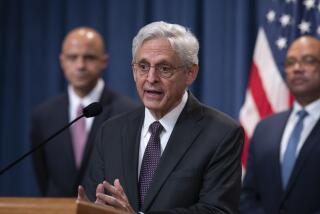Pakistan indicts 5 Americans on terrorism charges
- Share via
Reporting from Washington and Islamabad, Pakistan — Five young American Muslims who last fall left their suburban Virginia homes and families with what Pakistani police say was a desire to wage holy war against American forces in Afghanistan were indicted Wednesday on charges of plotting terrorist attacks on Pakistani soil.
The indictments, handed down by a Pakistani anti-terrorism court in the eastern city of Sargodha, also accuse the men of conspiring to wage war against a national ally of Pakistan, a reference to Afghanistan, and funding banned Pakistani extremist groups.
If convicted, they could be sentenced to life in prison, prosecutor Nadeem Akram Cheema said.
Khalid Khawaja, a member of the group’s defense team, said his clients deny the charges and allege that they were beaten and tortured by police.
The men, all U.S. citizens, lived in Alexandria, Va. U.S. anti-terrorism officials have said they believe the ringleader was Ramy Zamzam, 22, an Egyptian-born dental student at Howard University.
The other defendants are Umar Farooq, 25, born in Pakistan and a naturalized U.S. citizen; Waqar Khan, 22, a Pakistani American; Amin Yemer, 18, of Ethiopian descent; and Ahmad Minni, 20, the son of Ethiopian immigrants.
In Washington, the head of the Council on American-Islamic Relations said his group and the families of the men were deeply concerned about the torture allegations and whether the trial in Pakistan will be fair.
“That case may not be open to the public, so we will call for due process and try to monitor the trial,” said Nihad Awad, executive director of the council. “I am also asking the American government to monitor the process as well, and investigate the allegations of torture.”
He said that except for a few letters, the families had heard nothing from the men. “They haven’t been able to speak to them,” he said.
The parents of one of the men received a handwritten letter from their son Tuesday in which he alleged that they were beaten and threatened with electrocution. A portion of the letter was obtained Wednesday by The Times. The family did not want to be identified.
“The police here does not care -- they beat the hell out of me and the rest of us until we said what they wanted us to say. They told us not to say anything to anyone about what happened. . . . They even threatened to electrocute us the day before court so we don’t tell the judge.”
Pakistani officials have denied the accusations of torture.
Experts said the bizarre odyssey that brought the men to Pakistan appeared to have been poorly planned. Islamic militant networks, they said, probably would have been wary of allowing green recruits from the West into their fold.
But Cheema, the prosecutor, said authorities had evidence that the men had Pakistani targets in mind, including a nuclear plant in Chashma, in Punjab province, and an air force base in Mianwali, also in Punjab.
Cheema said the defendants had maps showing the area surrounding the nuclear plant and another showing the location of the air force base. Usman Anwar, a Sargodha police official who questioned the men, said they had photos of the plant.
Police allege that the men were following the instructions of a Pakistani militant who recruited them and became their primary contact as they tried to make their way to Afghanistan.
That militant, whom police say the men knew only as Saifullah, allegedly recruited them through an exchange of e-mails in late summer and the fall.
Anwar said that, during questioning, the men said Saifullah talked of the Chashma power plant and Mianwali air force base as potential targets.
The men left Washington on Nov. 28, leaving behind a videotape for relatives that showed scenes of American casualties and a speech by one of the men talking about the need to defend Muslims.
They were arrested Dec. 9 in Sargodha.
The trial is expected to begin March 31.
Officials in Washington said they were closely watching the case and had not yet decided how to proceed should any of the men return to the United States.
“Any time you have U.S. personnel captured and actually charged for potential terrorist activities, there will be an interest in that,” a law enforcement official said, speaking on condition of anonymity.
alex.rodriguez@
latimes.com richard.serrano@
latimes.com
More to Read
Sign up for Essential California
The most important California stories and recommendations in your inbox every morning.
You may occasionally receive promotional content from the Los Angeles Times.













